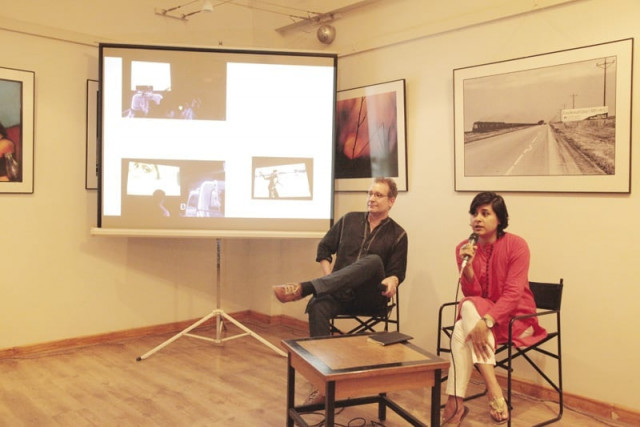Small and handy: All you need is a mobile phone to make films
German filmmaker Till Passow guides students on how to produce short films using their phones

Award-winning German filmmaker Till Passow and visual artist Yaminay Nasir Chaudhri hold a discussion with the audience after short films made by students of the Szabist media sciences department were screened. PHOTO: COURTESY SZABIST MEDIA SCIENCES DEPARTMENT
An event titled 'Mobile Phone Cinema and the Mega-City' was held at the café. The media sciences department of Shaheed Zulfikar Ali Bhutto Institute of Science and Technology (Szabist) organised the event in collaboration with German cultural centre Goethe Institut, Karachi. Students belonging to the Szabist media sciences group were guided by award-winning German filmmaker Till Passow during an eight-day workshop on how to produce short films using only their mobile phones. Passow made the participants of the workshop focus on the 'Surviving Strategies in a Mega-city'.
"Don't expect too much," said Passow, before the films were screened. "It's a work-in-progress type of thing. Some of them don't have subtitles, while one of the films is in Balochi." Nine short, interesting films were screened, with each of them having their own unique theme. The head of the Szabist media sciences department, Shehram Mokhtar, assisted the students in producing the films.
While each film had its own distinct quality, elements of drama, fiction, fun, thriller and much more were to be found in them. The way the amateur filmmakers managed to keep their audience glued to the screen spoke highly of the department's promise in producing the country's future filmmakers.
For example, the first film that was screened, How to survive in Karachi by Salman Noorani, was a gripping narrative of a young boy who embarks upon a journey to explore Karachi. His film begins with the narrator's small talk with the driver of what looked like a cab he was travelling in. What follows are a rickshaw ride and some camels at Sea View. The famous shrine of Abdullah Shah Ghazi was also shown. During this travel, the narrator asks someone if he feels scared in the city. He replies: "I don't watch news as they give you tension. I just believe in Allah and keep my eyes open." Moments later, the narrator is robbed of his mobile phone at gunpoint and the film ends.
The short film in Balochi did not have subtitles but the filmmaker, Farhad Jamali, translated it for the audience as and when the dialogues were delivered. It was based on a boxer living in Lyari who sells biryani in the area for only Rs5 per serving and is a boxing coach. "I teach these kids because I want them to stay away from drugs," he said. "They are like my own children."
Murtaza's film, titled 111-BTY-CLL, played with taboos of homosexuality and prostitution. The film shows a public restroom cubicle guarded by a few men. The narrator goes inside the cubicle and sees a phone number on its wall. The narrator dials the number and negotiates charges with the other man on the line. The dialogue between the two is portrayed in humorous light but an aura of a dark reality lurking behind is created effectively. The call drops and the film ends.
After the films, visual artist Yaminay Nasir Chaudhri and Passow held a discussion with the audience. Chaudhri asked them about their experiences while shooting films with a mobile phone. Many were of the view that mobile phones helped their subjects get more comfortable with being recorded. "It is not as intrusive and the subjects [feel they] can be themselves," said Ujala.
Published in The Express Tribune, January 28th, 2015.



















COMMENTS
Comments are moderated and generally will be posted if they are on-topic and not abusive.
For more information, please see our Comments FAQ